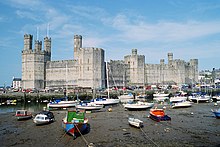Wales
![]()
The title of this article is ambiguous. For other meanings, see Wales (disambiguation).
Template:Infobox State/Maintenance/NAME-German
Wales [ˈweɪlz] (Welsh Cymru [![]()
![]() ˈkəm.rɨ], German veraltet Walisien or Wallis, Latin Cambria) is a part of the United Kingdom of Great Britain and Northern Ireland. It lies in the west of the island of Great Britain, bordering England and the Celtic and Irish Seas. The capital of Wales is Cardiff (Welsh Caerdydd). The country is counted among the six Celtic nations.
ˈkəm.rɨ], German veraltet Walisien or Wallis, Latin Cambria) is a part of the United Kingdom of Great Britain and Northern Ireland. It lies in the west of the island of Great Britain, bordering England and the Celtic and Irish Seas. The capital of Wales is Cardiff (Welsh Caerdydd). The country is counted among the six Celtic nations.
Etymology
The name of the country by the Welsh as Cymru or Old Cymric Cymry is derived from the Celtic *Kom-broges ("those who dwell on common land") or *Kom-brogi ("countrymen"). The English country name Wales, on the other hand, is a foreign name and comes from the Germanic word welsch. This in turn is derived from the Germanic word walhisc, which only referred to a certain Celtic tribe in southern Germania, the Volken.
Many Germanic tribes therefore called all Celts Walhisc ("Welsche"). However, the tendency to also refer to all Romance-speaking ethnic groups as Welsche developed early on. The reason for this was probably that almost all Celtic-speaking areas (except Ireland) were temporarily under Roman control and had been Romanized since the turn of time (see also Gaul), so that the Latin language soon became widely accepted there. For the same reason, in German-speaking Switzerland, Romandie, i.e. the French-speaking part of Switzerland, is also called "Welschland" or "Welsch Switzerland". In South Tyrol, the Italian language is also called "Walsch" and the Italian-speaking Trentino is called Welschtirol. Similarly, in Belgium, the name of the French-speaking part of the country, Wallonia, is derived from it.
History
→ Main article: History of Wales
Wales has a distinct prehistory in which many megalithic sites were built and menhirs erected. At Llyn Cerrig Bach on Anglesey (Ynys Môn) the most important Iron Age sacrificial deposit in Britain has been found.
The Romans built a series of forts in the southern part of the country, the westernmost of which was at Carmarthen (Latin Maridunum). A legionary camp was built near Caerleon (Caerllion). The associated amphitheatre is one of the best preserved in Britain. The Romans were also active in the north of Wales.
Wales was never conquered by the Anglo-Saxons due to the fierce resistance of its people and its mountainous terrain, and thus remained a Celtic region.
When the Anglo-Saxons spread into southeastern Britain in the 5th and 6th centuries, many Romanized Celts retreated to the west, i.e. to what is now Cornwall and Wales, which thus got their names. There they tried for quite a long time to hold on to Christianity and the Latin language, as for example the finds from Tintagel Castle prove. But in the end, the Roman-Late Antique culture in Wales perished, and older Celtic traditions reasserted themselves, whereby contacts with Ireland also played a role.
Wales is said to have been Christianized before England and Scotland. According to later tradition, the national saint Saint David (Dewi Sant) made a pilgrimage to Rome in the late 6th century and served as a bishop upon his return. At this time, renewed Christianization had just begun in the Anglo-Saxon area. On the other hand, the Druidic customs that are said to have survived to the present day and are allegedly maintained in parts of Wales are an invention of 19th century historians. Nothing is known about the actual customs of the Druids, who were exterminated by the Romans.
Shortly after the Norman conquest of England (1066), the Normans began to conquer parts of Wales. Although the Welsh principalities were often at odds with each other, the conquerors were only able to bring parts of the country under their rule. The conquered territories formed the Welsh Marches (Y Mers), whose barons enjoyed greater autonomy from the English kings. In the 13th century the princes of Gwynedd achieved supremacy over the other Welsh princes, and in 1267 the English king was forced to recognize Llywelyn ap Glyndŵr as prince of Wales. In two campaigns by 1283, however, King Edward I was able to defeat the Welsh and conquer Wales. The English, later British, heir to the throne has since that time borne the title Prince of Wales ("Prince of Wales", Tywysog Cymru). There were several rebellions against strict English rule, the most significant of which was the rebellion of Owain Glyndŵr, who declared himself Prince of Wales in 1400 and conquered large parts of Wales. From 1405, however, English forces succeeded in pushing back the rebels, and by 1409 Owain Glyndŵr was defeated.
The Act of Union, the laws for the incorporation of Wales 1535-1542, finally ended the special position of the Welsh Marches and divided Wales into thirteen counties. English law now applied in Wales. This meant that English was introduced as the official language, which kept most natives out of public office.
Wales became heavily industrialised in modern times on the back of extensive coal deposits. The Penrhyn mine was the largest man-made hole in the ground at the end of the 19th century. The period between 1830 and 1850 was one of unrest and rebellion. In 1831 a rebellion in Merthyr Tydfil (Merthyr Tudful) was bloodily put down. In 1839 Chartists rebelled in the region around Newport (Casnewydd). In the same year, as well as from 1842 to 1843, the so-called Rebecca Riots (Helyntion Beca) were carried out by representatives of the rural population in south-west Wales, centred in Carmarthenshire (Sir Gaerfyrddin), which resulted in the abolition of tolls on the new Turnpike Roads. Additional tension was caused in 1847 by the publication of a parliamentary report (Blue book), prepared largely by Anglican clergymen, which described the people of Wales as lazy and morally weak and blamed them for belonging to nonconformist churches and not speaking English. Wales became a stronghold of trade unions, syndicalism and socialism in the following decades. From 1901 to 1903 the Penrhyn mine was on strike, with occasional clashes. Repeatedly during this period the military was also used to put down strikes. In a railway strike in 1911, two workers were shot dead by the military. The first Labour Party (Plaid Lafur) member of the BritishParliament, Keir Hardie, was elected for the Welsh constituency of Merthyr Tydfil (Merthyr Tudful) in 1900. During this period religious non-conformism dominated Welsh society.
Welsh nationalism grew in importance in the 20th century. The Plaid Cymru party (Party of Wales), which won its first parliamentary seat in 1966, campaigned for greater autonomy and the revival of the Welsh language. Largely as a result of this, devolution became a major Labour Party concern, and in 1998, following a referendum, the National Assembly for Wales (Cynulliad Cenedlaethol Cymru), which was renamed the Welsh Parliament (Senedd Cymru, Welsh Parliament) in May 2020, was finally constituted. It was given plenary powers over public expenditure within Wales. A new parliament building was opened in Cardiff (Caerdydd) on 2 March 2006.
See also: History of Britain, History of the United Kingdom, List of Welsh rulers

Caernarfon Castle, Gwynedd

Play media file Mark Drakeford, First Minister, at one of the Welsh Government's daily COVID-19 press conferences.
Questions and Answers
Q: What is Wales?
A: Wales is a country that is part of the United Kingdom. It is located west of England and east of the Irish Sea and Ireland, and is one of the six Celtic nations.
Q: Who are the native people of Wales?
A: The native people of Wales are called Welsh. They have their own culture and traditions, as well as their own Celtic language, Welsh.
Q: How many people live in Wales?
A: Approximately three million people live in Wales. Most reside in the southern and eastern parts of the country.
Q: What is the capital city of Wales?
A: The capital city of Wales is Cardiff, which also happens to be its largest city. The next largest city after Cardiff is Swansea.
Q: How many Welsh people can speak Welsh?
A: About 20% of Welsh people can speak Welsh fluently, while nearly all can speak English - some even only speaking English.
Q: Does Welsh have official status in Wales?
A: Yes, Welsh has been given official status in Wales by law.
Search within the encyclopedia